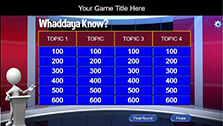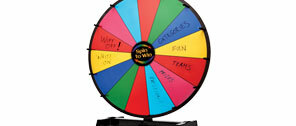The point of any learning game is the debrief—the conversation at the end of the experience when facilitators tease out observations and learning points.
LEARNING GAMES ARE WORTH THE BOTHER!
Make the most of any learning game! Learners don't want to be in training sessions that they feel are a waste of time. Similarly, facilitators want to use their time well. Skilled trainers, teachers, and facilitators know that learning becomes more "sticky" if they can create experiences that draw out emotions, incorporate physical movement, include surprise, and help learners stay focused. It's why games are the perfect conduit for growth and learning, and the reason trainers take time to find the perfect experiences.
One more benefit of games is that they remove you from the real world. If facing a challenge that differs from their real job, players often feel safer trying new things, take risks, and assume different roles. They get to see how normal tendencies, ways of thinking, and manners of behaving play out and intersect with others.
DEBRIEF LEARNING GAMES, EXERCISES, AND ACTIVITIES
But that's just the start. For experiences to stick -- for them to move to long-term memory -- individuals must take time to think about what happened. They have to talk about it, relate it to something they already know, understand its importance, and consider when they might need to retrieve that learning down the road. After all, we only remember what we take time to think about (otherwise it's quickly in and out of our brains). That's the importance of a DEBRIEF!
You'll find the Session Debriefs Thumball useful for games focusing on:
- Team building
- Communication
- Leadership
- Process improvement
- Negotiations
- ... and more
SESSION DEBRIEF PROMPTS BASED ON BRAIN SCIENCE
I realize that may have sounded like a lot of memory and brain gobbledy gook above, but it's all applied in the Session Debrief Thumball.
This unique Silver Series Thumball offers a variety of conversation prompts that will help players consider the behaviors, strategies, and communication techniques that helped and hindered their success. Among the 32 prompts, you’ll find discussion starters that help players think about and process their experience and focus on the learning points worthy of long-term memory. For instance:
- Home in on feelings experienced during the game
- Consider roles assumed by various players and how those emerged
- Observe the strategies that help divide the group or build consensus
- Think about the means by which leaders emerged
- Understand communication strategies that helped or hindered the group's efforts
- Apply lessons to real world challenges
©Trainers Warehouse – Trainers Warehouse holds the copyright for this set of questions. Reproductions cannot be made without express approval.
MORE LEARNING GAMES AVAILABLE FROM TRAINERS WAREHOUSE
Trainers Warehouse sells so much more than Thumballs. Explore a variety games that build awareness or skill in communication, team development, and leadership. Find additional debrief tools here.















































